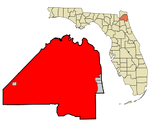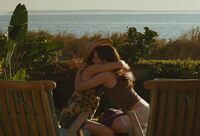No edit summary |
|||
| Line 12: | Line 12: | ||
Jacksonville is the largest American city in land area in the lower 48 states. Jacksonville is located near the oldest continuously occupied American settlement, St. Augustine. In 2008, it's population was 807,815 people. Jacksonville city council is the governing body. The Mayor is John Peyton. Ashley Greene (aka Alice) lived in Jacksonville until she was 17, when she moved to L.A. |
Jacksonville is the largest American city in land area in the lower 48 states. Jacksonville is located near the oldest continuously occupied American settlement, St. Augustine. In 2008, it's population was 807,815 people. Jacksonville city council is the governing body. The Mayor is John Peyton. Ashley Greene (aka Alice) lived in Jacksonville until she was 17, when she moved to L.A. |
||
| + | |||
| + | ==Climate== |
||
| + | |||
| + | Jacksonville has a humid subtropical climate (Koppen Cfa), with mild weather during winters and hot weather during summers. High temperatures average 64 to 91 °F (18 to 33 °C) throughout the year. High heat indices are not uncommon for the summer months in the Jacksonville area. High temperatures can reach the mid and upper 90s with heat indices above 110 °F (43.3 °C) possible. The highest temperature ever recorded in Jacksonville was 105 °F (41 °C) on July 21, 1942. It is common for thunderstorms to erupt during a typical summer afternoon. These are caused by the rapid heating of the land relative to the water, combined with extremely high humidity. |
||
| + | |||
| + | During winter, there can be hard freezes during the night. Such cold weather is usually short lived, as the city averages only 10 to 15 nights below freezing. The coldest temperature recorded at Jacksonville International Airport was 7 °F (−13.9 °C) on January 21, 1985, a day that still holds the record cold for many locations in the eastern half of the US. Even rarer in Jacksonville than freezing temperatures is snow. When snow does fall, it usually melts upon making contact with the ground. Most residents of Jacksonville can remember accumulated snow on only one occasion—-a thin ground cover that occurred December 23 of 1989. |
||
| + | |||
| + | Jacksonville has suffered less damage from hurricanes than most other east coast cities, although the threat does exist for a direct hit by a major hurricane. The city has only received one direct hit from a hurricane since 1871, although Jacksonville has experienced hurricane or near-hurricane conditions more than a dozen times due to storms passing through the state from the Gulf of Mexico to the Atlantic Ocean, or passing to the north or south in the Atlantic and brushing past the area. The strongest effect on Jacksonville was from Hurricane Dora in 1964, the only recorded storm to hit the First Coast with sustained hurricane force winds. The eye crossed St. Augustine with winds that had just barely diminished to 110 mph (180 km/h), making it a strong Category 2 on the Saffir-Simpson Scale. Jacksonville also suffered damage from 2008's Tropical Storm Fay which crisscrossed the state, bringing parts of Jacksonville under darkness for four days. Similarly, four years prior to this, Jacksonville was inundated by Hurricane Frances and Hurricane Jeanne, which made landfall south of the area. These tropical cyclones were the costliest indirect hits to Jacksonville. Hurricane Floyd in 1999 caused damage mainly to Jacksonville Beach. During Floyd, the Jacksonville Beach pier was completely destroyed. The rebuilt pier was later heavily damaged by Fay, but not destroyed. |
||
| + | |||
| + | Rainfall averages around 52 inches (1,300 mm) a year, with the wettest months being June through September. |
||
==Gallery== |
==Gallery== |
||
Revision as of 05:37, 12 August 2010

Jacksonville is the largest city in the U.S. state of Florida, and is the county seat of Duval County. In the Twilight Series, it is the Florida city where Bella's mother and stepfather live. Renée tries to convince Bella to move there after the accident in Twilight, but she wants to stay in Forks.
In the Twilight series
Renée Dwyer and Phil Dwyer decide to rent a house in Jacksonville after Phil gets a job playing on a baseball team. Jacksonville's Minor League baseball team is called the Jacksonville Suns. Bella and Edward visit them in Eclipse and Renée tries to convince Bella to go to school there, but Bella says she would rather drink water than breathe it, referring to Jacksonville's hot and humid weather.

Another connection between the movie and the city; Ashley Greene, the actress portraying Alice Cullen in the movie, is from Jacksonville, Florida.
Outside the Twilight series
Jacksonville is the largest American city in land area in the lower 48 states. Jacksonville is located near the oldest continuously occupied American settlement, St. Augustine. In 2008, it's population was 807,815 people. Jacksonville city council is the governing body. The Mayor is John Peyton. Ashley Greene (aka Alice) lived in Jacksonville until she was 17, when she moved to L.A.
Climate
Jacksonville has a humid subtropical climate (Koppen Cfa), with mild weather during winters and hot weather during summers. High temperatures average 64 to 91 °F (18 to 33 °C) throughout the year. High heat indices are not uncommon for the summer months in the Jacksonville area. High temperatures can reach the mid and upper 90s with heat indices above 110 °F (43.3 °C) possible. The highest temperature ever recorded in Jacksonville was 105 °F (41 °C) on July 21, 1942. It is common for thunderstorms to erupt during a typical summer afternoon. These are caused by the rapid heating of the land relative to the water, combined with extremely high humidity.
During winter, there can be hard freezes during the night. Such cold weather is usually short lived, as the city averages only 10 to 15 nights below freezing. The coldest temperature recorded at Jacksonville International Airport was 7 °F (−13.9 °C) on January 21, 1985, a day that still holds the record cold for many locations in the eastern half of the US. Even rarer in Jacksonville than freezing temperatures is snow. When snow does fall, it usually melts upon making contact with the ground. Most residents of Jacksonville can remember accumulated snow on only one occasion—-a thin ground cover that occurred December 23 of 1989.
Jacksonville has suffered less damage from hurricanes than most other east coast cities, although the threat does exist for a direct hit by a major hurricane. The city has only received one direct hit from a hurricane since 1871, although Jacksonville has experienced hurricane or near-hurricane conditions more than a dozen times due to storms passing through the state from the Gulf of Mexico to the Atlantic Ocean, or passing to the north or south in the Atlantic and brushing past the area. The strongest effect on Jacksonville was from Hurricane Dora in 1964, the only recorded storm to hit the First Coast with sustained hurricane force winds. The eye crossed St. Augustine with winds that had just barely diminished to 110 mph (180 km/h), making it a strong Category 2 on the Saffir-Simpson Scale. Jacksonville also suffered damage from 2008's Tropical Storm Fay which crisscrossed the state, bringing parts of Jacksonville under darkness for four days. Similarly, four years prior to this, Jacksonville was inundated by Hurricane Frances and Hurricane Jeanne, which made landfall south of the area. These tropical cyclones were the costliest indirect hits to Jacksonville. Hurricane Floyd in 1999 caused damage mainly to Jacksonville Beach. During Floyd, the Jacksonville Beach pier was completely destroyed. The rebuilt pier was later heavily damaged by Fay, but not destroyed.
Rainfall averages around 52 inches (1,300 mm) a year, with the wettest months being June through September.
Gallery
| Locations | |
|---|---|
| Washington cities | Forks • La Push • Port Angeles • Seattle |
| Other cities | Denali, Alaska • Jacksonville, Florida • Biloxi, Mississippi • Philadelphia, Pennsylvania • Phoenix, Arizona • Volterra, Italy |
| Businesses | The Lodge • Mimi's School of Dance • Newton's Olympic Outfitters • Thunderbird and Whale Bookstore |
| Other locations | Character homes • First Beach • Forks High School • Forks Hospital • Isle Esme • La Bella Italia • The Meadow |






 This article is a
This article is a